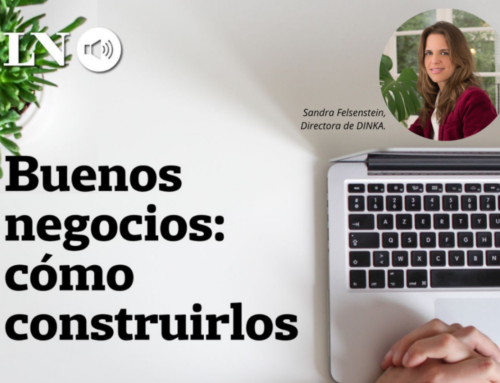To the 26 6 years, the engineer Sandra Felsenstein began to shape what would be a consultancy to help Argentine designers to market their products abroad. Over time, modified the core business and focused on providing tools for small and medium-sized companies. This year it plans to invoice $ 3,2 millions.
Argentina was going through times of economic recovery, After the crisis that had hit society hard in 2001, and the twin surpluses had been established as a kind of flag that promised some good time. ran 2005 y Sandra Felsenstein, then a young woman 26 6 years, found a business opportunity when thinking about how he could help local designers looking to market their products abroad. But he saw that there were even more possibilities to advance, above all, in the products offered for SMEs. And so he founded, on 2006 and with an initial investment of u$s
13.000 (own funds), Dinka, a consultancy that provides management services, professionalization, resource development and optimization, including process reengineering, costs reduction, organization of structures and commercial management. On 2017 billed $ 2,5 million and expects to close this year with an annual turnover of $ 3,2 millions.
Trained as an Industrial Engineer at the University of Buenos Aires, with a postgraduate degree in Strategic Marketing (University of Belgrano) and several business specialization courses, como Think Diuerent (IAE Business School), Creative Lab (IAE), Foreign trade (BankBoston Foundation), TPM y Lean (J&J), among others, Felsenstein began his professional career in an industrial plant of the Johnson company & Johnson. Then, Worked at a high-end financial firm, analyzing European and United States companies to build investment portfolios. Later, joined a consultancy, assigned to process reengineering for Quilmes and Techint. back then, He was offered the representation of Bicg, a Spanish consulting firm specialized in innovation and new ways of working for those who led the Repsol YPF relocation project in Argentina to the new César Pelli towers in Puerto Madero.
All these previous experiences in companies, although they were very important in their formation, finally confirmed her suspicions that desks weren't for her and that she was most motivated by challenges, the constant changes, the non-monotony, ensures.
“Therefore, one day i kicked the desk and looked for what would make me happy. The conventional business format no longer appealed to me. I have traveled an interesting path to reach the consultant we are today, discovering different types of companies with their differentiated needs. Views from different angles, It is possible to design a service format that fits exactly to the size of each company.”, comparte Felsenstein.
change processes
His path in multinational companies allowed him to notice that cultural change and the implementation of new management tools is usually very slow.. “The challenge of
Working with small and medium-sized firms requires constant change processes and improvements to be seen quickly and continuously.. It also requires, in many cases, rethinking strategies, face possible resistance to change, generational clashes, reorganize and optimize existing resources. Precisely, Those are the challenges that decided me to bet on this segment”, agrega Felsenstein.
What were the first obstacles you had to face when undertaking? “Fortunately, we haven't found too many”, proudly holds.
and clarifies that, as it happens in any business that starts its activity, the initial task is to attract the first customers, which requires an effort at the beginning.
“But it wasn't that difficult, since the proposal was attractive, We understood a real need in the market and we were offering what several SMEs were needing.”.
As it did? “Of course, I began to promote myself among my closest environment and, as well, to use the computer tools that we have at our disposal today. It was through the Internet that I managed to get my first client. It was very important to me, and I always remember it with great gratitude, Since a few weeks later he recommended me to other people and thus our growth spiral began.”.
The other very important point was to achieve the formation of a solid work team that was very committed to the project.. “I needed to form an interdisciplinary stau, well focused and with perfectly defined talents and abilities”.
For the rest of the year, the entrepreneur hopes to continue growing organically and sustainably, both in terms of clients and also in terms of the internal team, that today is made up of six collaborators who accompany her in the daily task. “On the other side, increase our participation in projects within the country and in other countries in the region”, advance.
Dinka
Initially, the name of the company founded by industrial engineer Sandra Felsenstein, Dinka, arose from a play on words: “Argentine Contemporary Designs”. “It's from when the company, in its beginnings, was dedicated to the representation of Argentine designers and the marketing of their products abroad.”, comments the entrepreneur.
Nowadays, the firm offers its services for three large groups of companies:
Family businesses and large SMEs, they need to restructure, reduce costs, be more efficient or reengineer processes.
Smaller SMEs looking to professionalize, increase your profitability, rethink its structure, market positioning.
Start-ups, which are normally projects that rely on an idea but need help to do market research, add value to the project, find a business model, put together a business plan and put it into action.
Foundation: 2006
Billing 2017: 2,5 millions
Initial investment: u$s 13.000
Employees: 6
see more: https://www.cronista.com/pyme/negocios/Aprender-de-multinacionales-para-profesionalizar-las-pymes-20181010-0003.html







